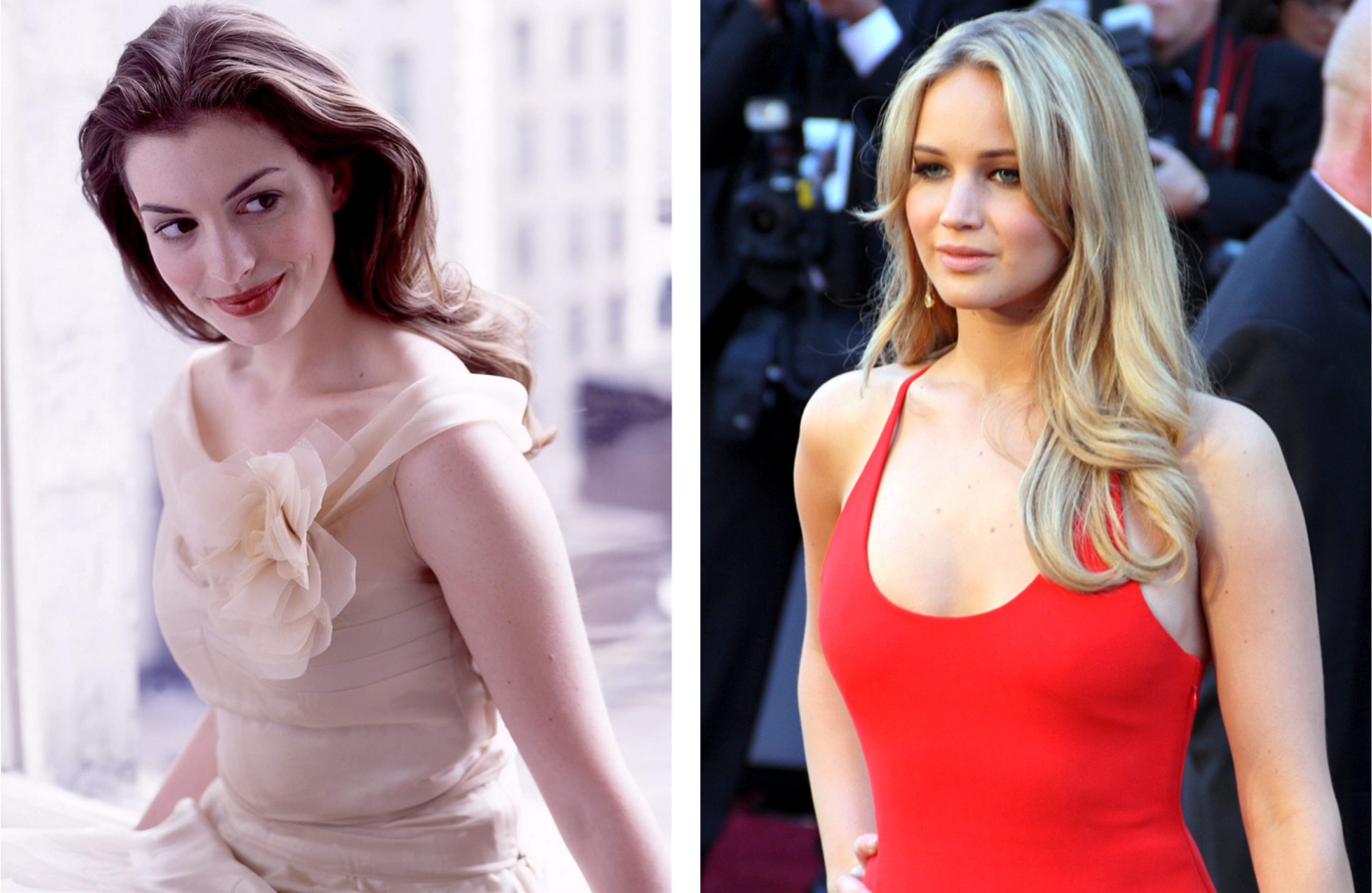Unraveling the psychology behind our obsession (and vilification) of actresses “J Law” and Anne Hathaway.
by Ashley Canino
Jennifer Lawrence had an ominous premonition as she took a tumble on the Oscars’ 2014 red carpet: “You’re fucked. They’re totally going to think this is an act.” The fall was a follow-up to her 2013 trip up the stairs to receive the Best Actress award. She shared this thought with Marie Claire during an interview in which she also admitted she doesn’t think before she speaks and, oh yeah, she was on her period. The over-sharing and clumsiness are par for the course for “J-Law,” as fans and the blogosphere refer to her.
It’s no coincidence that Lawrence–how tempting it is to just call her “Jennifer–” won her Oscar portraying Tiffany, the idiosyncratic and vulnerable lead of Silver Linings Playbook. The character was humorous, awkward and carefully exposed throughout the film–an extreme projection of Lawrence’s compulsive over-sharing and clumsiness. Before the X-Men star held the role, Tiffany was to be played by Anne Hathaway, who left the film over “creative differences.” Hathaway took home the Best Supporting Actress Oscar on the same night for the much more, well, miserable film, Les Misérables. While James Franco has, on national television, compared Hathaway to the “Tasmanian devil,” Jimmy Fallon was giddy when he recounted, with Lawrence, the time they approached Jennifer Lopez for a dance after throwing back a few Jell-O shots. J-Lo shot them down. Both Lawrence and Hathaway are critically acclaimed for their talent, but only one earns credit for her off-set demeanor. The actresses represent opposite poles of audience affinity, Lawrence being beloved and Hathaway being widely hated on charges of contrivance and insincerity.
And what if Hathaway or Lawrence are putting on an act–so what? Acting is precisely what they are paid and awarded to do. Thanks to the media and proliferation of technology that allow us to be aware of celebrities’ off-set lives, we have a tendency to develop one-sided relationships with these people. Donald Horton and Richard Wohl coined these relationships as “para-social” in 1956, the same year the remote control was invented and ten years before color television sets were mass-market items. As television, tabloids and the Internet capture more and more angles of actors’ lives, our para-social friendships become that much more complex. Unlike real-life, two-sided relationships, our exposure to celebrities is mostly through mediated platforms like television. Audiences having interest enough in celebrities’ actions off-screen is evidence of the para-social relationships we form with these personalities.
Huffington Post blogger Christina Pesoli identifies that some women unconsciously hold a “two out of three rule” where other women view women who have success in love, looks, and career as threatening. Good friends can only have success in up to two of those areas, according to the rule. It may be harder to identify this phenomenon within your social circle because it is more difficult to examine nuanced, intimate friendships and, really–how many of your pals are runaway successes in all of these areas? In para-social relationships, the existence of the two out of three rule is easier to validate. Hathaway’s wide eyes and breathtaking smile, powerful performances on the silver screen and marriage to actor Adam Shulman are not offensive facts of her life, but in sum, drive her haters. Lawrence, on the other hand, makes sure to note that her enviable figure is “obese” on the Hollywood scale, face plants when collecting awards, and plays down her relationship with actor Nicholas Hoult, telling Marie Claire that when they are busy they just, “mutually ignore each other.” She, either intentionally or unintentionally, manages to have success in Pesoli’s three key areas, but rides just under the radar in all of them.
Are you a Hathaway hater because she is a woman who has won the trifecta? Do you gossip about your recently promoted coworker for the same reason? Understanding the judgments we make in our one- way relationships with celebrities could give us some insight into our values in friendships with people who know us as well as we know them–a space in life where it is thankfully more difficult to get away with snap judgments, and black-and-white observations of people.
Photos edited for top art. Hathaway image courtesy Horus Tr4n. Lawrence image courtesy Mingle MediaTV.




